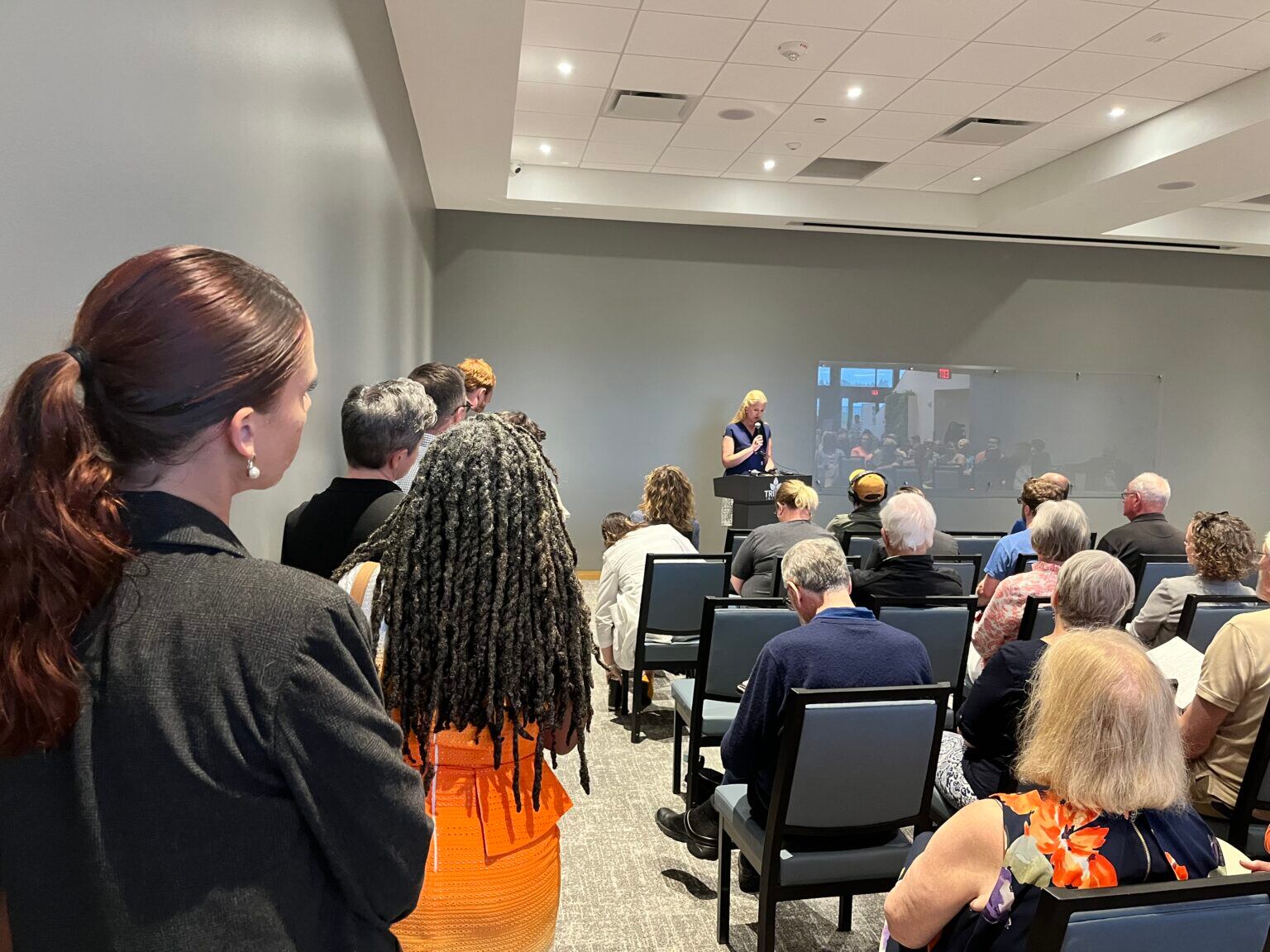Nebraskans Voice Concerns Over Health Care Cuts in Federal Budget Reconciliation

OMAHA, Neb. ( Nebraska Examiner ) - As the U.S. Senate prepares for a vote as early as this week on a budget reconciliation bill, Nebraskans gathered and called on their congressional delegation to consider the negative impacts of the legislation on health care.
Over a dozen people spoke out against the proposal at a town hall in Omaha hosted by Nebraska Appleseed and the American Cancer Society Action Network. Speakers included state senators, medical professionals, activists and everyday Nebraskans. All said the current proposal would have disastrous consequences for health care access across the state.
“It’s been across the board, people are raising the alarm bells as to just how harmful this is going to be,” said State Sen. Jason Prokop of Lincoln.
Congress is currently considering a budget reconciliation bill that would accomplish several goals President Donald Trump campaigned on. Among many other things, the proposal would scale back Medicaid benefits nationwide.
A version of the bill has already passed the House, and Senate leaders say they’re hoping to vote on their version soon, with the goal to send the bill to Trump’s desk by July 4.
With the Senate bill still in flux, Monday’s town hall focused on the House version of the bill, according to Nebraska Appleseed program director Sarah Maresh. Under the bill, Maresh said up to 55,000 Nebraskans could lose their health care coverage, and the state itself could lose roughly $4 billion in federal funding for the program.
Even for people on private insurance, Maresh said the House proposal would have widespread negative impacts on Nebraska’s health care industry. For one, she said wait times in emergency rooms would likely increase, as more people are forced to put off preventative treatment until their ailments grow un-ignorable.
“Everyone is going to feel the impacts of these cuts,” Maresh said.
Prokop said the funding cuts would shift more burden onto state governments and noted that Nebraska has already faced tough budget challenges this year that are likely to continue.
Trevor Toteve, policy analyst for OpenSky Policy Institute, said the cap on provider taxes included in the bill would halve federal funds slated to come to Nebraska from a hospital assessment bill state lawmakers passed last year.
Prokop also said the bill goes against the Medicaid expansion Nebraska voters passed in 2018, continuing a trend established in the Legislature this session of some state leaders ignoring the will of voters. His remark prompted audible murmurs of agreement from the crowd.
What Nebraska’s congressional delegates have to say
U.S. Rep. Don Bacon, R-Neb., has expressed hesitance in supporting Medicaid cuts, but he voted for them after he said he received assurances that the bill would not degrade the quality of health care for people covered by Medicaid. He said he supports provisions of the bill that would impose work requirements on able-bodied adults and bar people in the country illegally from accessing coverage.
“Requiring able-bodied adults to work, removing those enrolled twice or not here in the country legally and a yearly audit are easy to defend,” Bacon said in an emailed statement.
U.S. Rep. Adrian Smith, R-Neb., had similar thoughts to Bacon’s, saying that he wants to address “waste, fraud and abuse,” while ensuring that vulnerable Americans retain access to Medicaid.
Creighton University medical student Marshall Biven called comments like theirs “disinformation” on Monday, noting that migrants without documentation already aren’t allowed to access Medicaid.
In response to House passage of the bill, U.S. Rep. Mike Flood, R-Neb., celebrated the “historic tax relief” he said the bill would provide and argued that it would “refocus” Medicaid on its core mission.
“These common sense conservative policies are a victory for the American people, and we urge our colleagues in the Senate to act swiftly so that the president can sign this bill into law,” Flood said.
Republican U.S. Sen. Deb Fischer’s office declined to comment on the town hall. The office of fellow GOP U.S. Sen. Pete Ricketts had no immediate response to a request for comment.
More concerns expressed
Maresh addressed the arguments favoring the work requirements proposed in the bill, claiming similar strategies have proven ineffective in encouraging more people to work.
Edison McDonald, executive director of National Disability Action, expanded on this, saying that while he was leading a past business, a disabled employee declined a promotion he offered her because it would make her ineligible for her $60,000 annual Medicaid coverage.
“What I’ve seen through my time is how frustrating the process is,” McDonald said. “How many times the government gets in the way of encouraging work.”
Biven, the Creighton medical student, argued a provision of the bill that would cap student loan borrowing would further discourage students from entering medical school. The maximum cap up for consideration is $200,000, and Biven said he is on track to be roughly $400,000 in loan debt by the time he graduates in 2028.
Ann Anderson Berry, executive director of the Child Health Research Institute at the University of Nebraska Medical Center, said the bill would have major impacts on Nebraska’s maternal health care field, which was already struggling.
She said Nebraska currently ranks fifth for maternal health care deserts, places with the longest distance to travel to access maternal health care, and is also dealing with rising infant mortality rates. Further cuts would only continue to harm access, she said.
“I can’t think of a worse decision for Nebraska families,” Berry said.
Nebraska Examiner is part of States Newsroom, a nonprofit news network supported by grants and a coalition of donors as a 501c(3) public charity. Nebraska Examiner maintains editorial independence. Contact Editor Aaron Sanderford for questions: info@nebraskaexaminer.com .
Click here to subscribe to our 10/11 NOW daily digest and breaking news alerts delivered straight to your email inbox.
Post a Comment for "Nebraskans Voice Concerns Over Health Care Cuts in Federal Budget Reconciliation"
Post a Comment